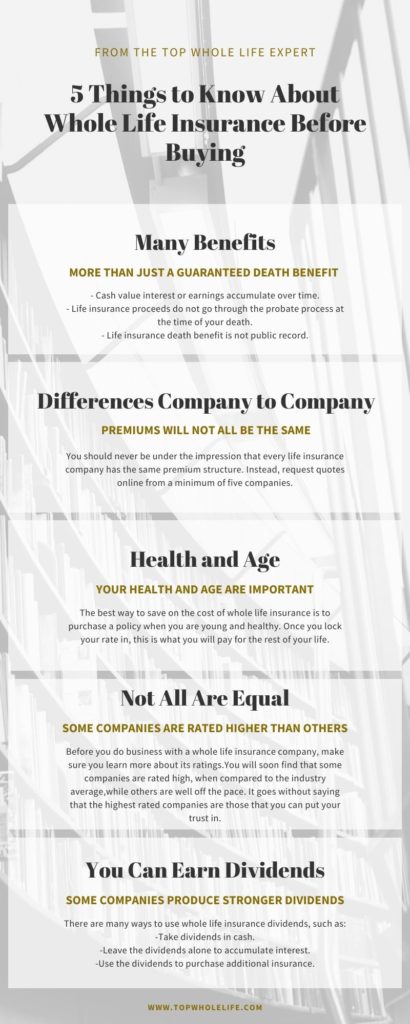Even if you have a basic understanding of whole life insurance, you may not have enough knowledge to make an informed decision as to whether this is the best type of coverage for you.
Fortunately, when you collect the right information, it becomes easier to decide if whole life insurance could be a good addition to your financial plan.
 Here are five things to know about whole life insurance before buying a policy:
Here are five things to know about whole life insurance before buying a policy:
1. Many Benefits
Most people understand the primary benefit of whole life insurance: a guaranteed death benefit paid to their beneficiary.
However, there are other benefits to think about:
- Cash value interest or earnings accumulate over time.
- Life insurance proceeds do not go through the probate process at the time of your death.
- Life insurance death benefit is not a public record.
Along with the above, there is one last benefit to consider: there are hundreds of whole life insurance companies, each of which is willing to provide you with a quote to show you what they have to offer.
2. Premiums Differ from Company to Company
It would help if you never were under the impression that every life insurance company has the same premium structure. Instead, request quotes online from a minimum of five companies. This will give you a clear understanding of how much each provider charges for the type of coverage you are interested in.
3. Your Health and Age are Important
Like most, you care about two things when buying whole life insurance:
- Securing a policy at the lowest possible price.
- Securing a policy with the highest possible death benefit based on your budget.
While there is nothing wrong with setting these goals, you need to keep in mind that whole life insurance companies have a system for calculating your premium.
In an overall sense, your health and age are the two most important factors. Generally speaking, the younger you are, the less you will pay for coverage. Along with this, healthier individuals always pay less than those with medical problems, such as cancer history.
The best way to save on the cost of whole life insurance is to purchase a policy when you are young and healthy. Once you lock your rate in, this is what you will pay for the rest of your life.
4. Some Companies are Rated Higher than Others
Before you do business with a whole life insurance company, make sure you learn more about its ratings.
You will soon find that some companies are rated high compared to the industry average, while others are well off the pace.
It goes without saying that the highest-rated companies are those that you can put your trust in.
5. You can Earn Dividends
The longer you keep your whole life insurance, the more you can collect in terms of dividends. It takes some time for this to kick in, but at some point, you will realize that you are adding value with each passing year.
There are many ways to use whole life insurance dividends, such as:
- Take dividends in cash.
- Leave the dividends alone to accumulate interest.
- Use the dividends to purchase additional insurance.
Before you make any decision, check with your insurance company to discuss the pros and cons of each option. There is typically more than meets the eye, so you don't want to do anything with your dividends until you fully understand the impact it will have on you and your policy.
Conclusion
There is a lot to learn about whole life insurance before buying a policy. You don't have to spend weeks on end collecting information and comparing data. Even so, it would be best if you took the time to improve your knowledge base, as this will work in your favor as you close in on a final decision.
There may never come a point when you know everything about whole life insurance, but that doesn't mean you can't make a purchase. You can always go online to learn more and to receive quotes. From there, you can reach out to each insurance company to ask questions and to get a better feel for what they offer.




